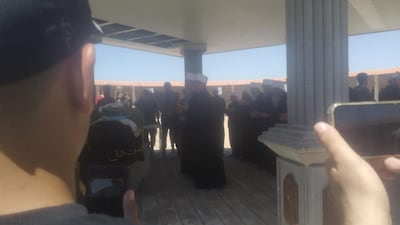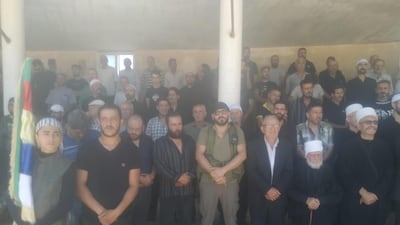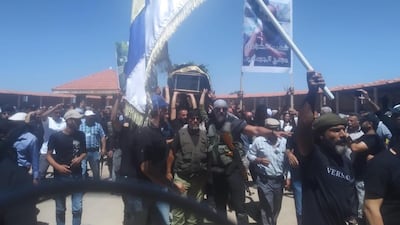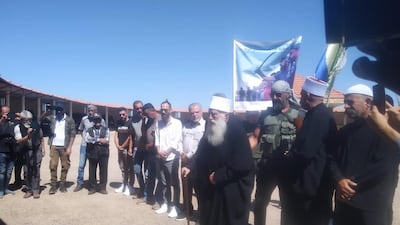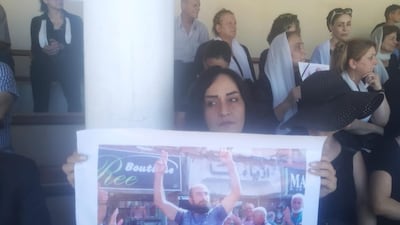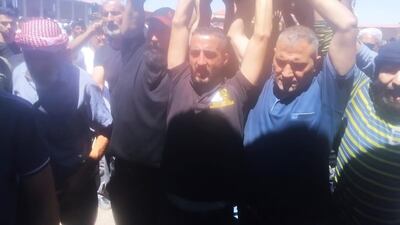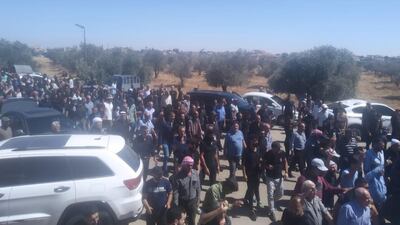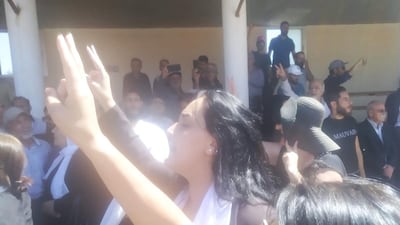Druze leaders in Syria called for restraint on Thursday over fears the assassination of a major figure in the sect’s southern heartland could turn an 11-month civil disobedience movement in the area into violence
Morhej Al Jaramani, who headed a militia in the mostly Druze governorate of Suweida, was assassinated on Tuesday at his home in Suweida city.
His armed loyalists guarded the demonstrations in the province against the rule of President Bashar Al Assad, helping establish a balance of power between unarmed Druze opposed to the President, and regular and paramilitary troops, comprising different sects, loyal to him.
The sustained protests in Suweida since last August have undermined the perception of unanimous support among Syria's minorities for Mr Al Assad, himself a member of the minority Alawite sect, since civil war broke out in 2011. This perceived support has underpinned Syria's system of rule since officers mostly from the Alawite sect took power in 1963 coup.
At Mr Al Jaramani's funeral on Thursday, Sheikh Hikmat Al Hajiri, the most senior of a triumvirate that forms the religious leadership of Syria’s Druze, said that the slain militia leader was a cornerstone of "preserving security" in Suweida and that his death was a "loss to freedom".
Sheikh Al Jajiri told mourners that whoever killed Mr Al Jaramani "must be punished", but their identity must be ascertained first.
Mr Al Jaramani was killed by one bullet in the head, fired through a window into his bedroom, according to the Suwayda24 network of citizen journalists. The funeral was in the village of Umm Al Zaytun, north of Suweida city.
Marwan Rizq, another Druze sheikh, who is not part of the triumvirate, said that the killing aimed to lure the Druze into mounting a violent retaliation against the regime.
"We will be triumphant, but with the olive branch," he said. "You [the regime] will not be able to drag us to your [armed] scene.
"When this doomed junta perishes, the homeland will be at peace."
The peaceful nature of the mass demonstrations, even though security forces have fired at the protesters, is seen as a major factor behind the continuation of the Suweida uprising. The non-violence is seen as having drawn previously apolitical Druze to the protest movement as economic conditions deteriorated in regime areas.
On Monday, security forces fired at a demonstration in central Suweida, wounding a man in his 70s. The crowd had gathered to protest against the election being held that day for the Syria's rubber stamp parliament. The poll was reportedly widely boycotted in Suweida.
In February, Druze gunmen attacked security installations after security forces shot dead a pro-democracy demonstrator, but the violence stopped quickly.
Suweida has been an anomaly throughout the Syrian civil war. Many residents armed themselves at the onset of the conflict, but stayed on the sidelines and mostly refused to serve in the military while also not actively attacking the state.
The Druze are a transnational minority, with a presence in Israel, Jordan and Lebanon. They are mainly concentrated in Suweida and in the southern Damascus suburb of Jaramana.
They numbered an estimated 700,000 in Syria before the 2011 revolt.
Suhail Thubian, a prominent civil figure in Suweida, told The National that the authorities had avoided using mass violence to crush the protest movement because Russia, the President's most powerful backer, appears opposed to such a move.
The assassination of Mr Al Jaramani, he said, was another attempt by the authorities to undermine the protest movement.
"The regime has been betting that we will give up and quit [protesting] on our own" he said. "It accused us of being separatists, it accused us of being agents of Israel, it fired at the demonstrations, and now this."
